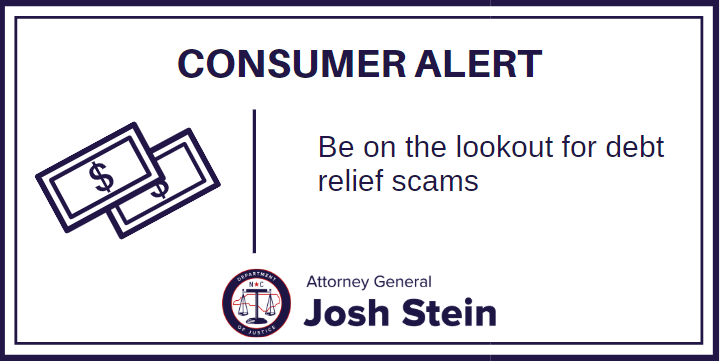
Wednesday, April 1, 2020
Whenever a crisis like the coronavirus pandemic happens, scammers try to take advantage of people’s economic fears to steal their money. As North Carolinians continue to adjust to the financial impacts of this pandemic, we want you to be on the lookout for debt relief scams. In these scams, scammers offer to help reduce consumers’ debt, but end up driving you further into debt.
Our office is working hard to protect people’s money, and we want you to be able to avoid coronavirus debt relief scams. The best way to protect yourself is to follow these tips:
- Watch out for debt negotiation or debt settlement scams. Avoid companies or out-of-state lawyers that offer to eliminate or cut your debts by negotiating with your creditors. These operations often collect large fees but reach few settlements with creditors, leaving you deeper in debt. Under North Carolina law, it’s illegal to collect any upfront fee for debt settlement services. Never pay upfront fees for debt settlement services and question any company that charges a high fee (such as 20 percent of your debt) to settle your debts.
- Avoid debt consolidation offers that could lead to foreclosure. Creditors may offer to consolidate your debt through a second mortgage or a home equity line of credit. Remember that these loans require you to put up your home as collateral. If you can’t make the payments or if your payments are late, you could lose your home.
- Stick to reputable sources to manage your debt. Watch out for unsolicited offers, and always get a second opinion before you sign a loan to refinance your debt. Contact your creditors directly to discuss options for repayment. For additional help, you can find an accredited, non-profit credit counselor in your area by contacting the National Foundation for Credit Counseling at 1-800-388-2227 or nfcc.org. Learn more about what credit counselors can charge for their services. Finally, if your debt is substantial, consider contacting a local bankruptcy attorney in your community to explore whether bankruptcy may be an option for you.
If a company contacts you and you’re unsure of their authenticity or if you believe that you have been the victim of a scam, contact our office’s Consumer Protection Division at ncdoj.gov/file-a-complaint or 1-877-5-NO-SCAM.
